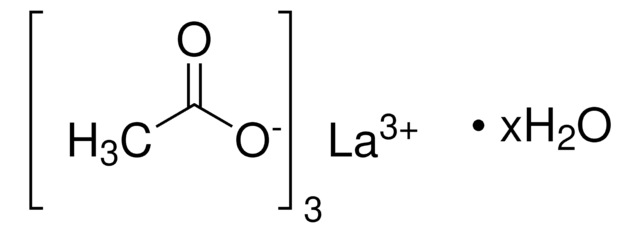203548
Lanthanum(III) nitrate hexahydrate
99.999% trace metals basis
Synonym(s):
Nitric acid, lanthanum (III) salt, hexahydrate
About This Item
Recommended Products
Quality Level
Assay
99.999% trace metals basis
form
solid
reaction suitability
reagent type: catalyst
core: lanthanum
impurities
≤15.0 ppm Trace Rare Earth Analysis
mp
65-68 °C
SMILES string
[La+3].[H]O[H].[H]O[H].[H]O[H].[H]O[H].[H]O[H].[H]O[H].[O-][N+]([O-])=O.[O-][N+]([O-])=O.[O-][N+]([O-])=O
InChI
1S/La.3NO3.6H2O/c;3*2-1(3)4;;;;;;/h;;;;6*1H2/q+3;3*-1;;;;;;
InChI key
GJKFIJKSBFYMQK-UHFFFAOYSA-N
Looking for similar products? Visit Product Comparison Guide
General description
Application
- α-aminonitriles by a one-pot three-component coupling of the carbonyl compound, amine, and TMSCN.
- Acetals and geminal diacetates (acylals)from aldehydes.
- Bis(indolyl) methanes under solvent‐free conditions.
Features and Benefits
- Thermal stability
- Low toxicity
- Mild reaction condition
- Chemoselectivity
- Low cost
Signal Word
Danger
Hazard Statements
Precautionary Statements
Hazard Classifications
Aquatic Acute 1 - Aquatic Chronic 1 - Eye Dam. 1 - Ox. Sol. 2
Storage Class Code
5.1B - Oxidizing hazardous materials
WGK
WGK 2
Personal Protective Equipment
Regulatory Listings
Regulatory Listings are mainly provided for chemical products. Only limited information can be provided here for non-chemical products. No entry means none of the components are listed. It is the user’s obligation to ensure the safe and legal use of the product.
FSL
Group 1: Oxidizing solids
Nitrates
Hazardous rank I
1st oxidizing solid
JAN Code
203548-100G:
203548-BULK:
203548-VAR:
203548-25G:
203548-500G:
Choose from one of the most recent versions:
Already Own This Product?
Find documentation for the products that you have recently purchased in the Document Library.
Customers Also Viewed
Articles
Lanthanide ions in spectral conversion enhance solar cell efficiency via photon conversion.
The prevailing strategies for heat and electric-power production that rely on fossil and fission fuels are having a negative impact on the environment and on our living conditions.
Rare earth elements are vital in everyday life worldwide: catalysts in cars, colors in screens, magnets in electronics. Essential for modern living.
Our team of scientists has experience in all areas of research including Life Science, Material Science, Chemical Synthesis, Chromatography, Analytical and many others.
Contact Technical Service














